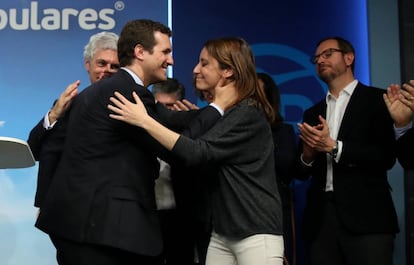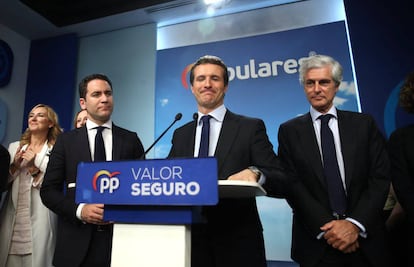How a shift to the right prompted the PP’s worst election night in 30 years
The conservative party’s disastrous showing at the April 28 polls proves, for many insiders, that going after supporters of far-right group Vox was a mistake. Here’s how the debacle unfolded


The date is Sunday, December 2, 2018. Spain’s Popular Party (PP) is not expecting impressive results at the elections in Andalusia, and the predictions come true: the conservatives lose nearly half of their representatives in the regional assembly. But the good performance by the center-right Ciudadanos (21 seats), which agrees to enter into a governing alliance with the PP, and the emergence of the far-right Vox party (12), which props up the alliance with its votes, makes it possible to end 36 years of uninterrupted rule by the Socialist Party (PSOE) in the southern region. At PP headquarters in Madrid, party leaders are ecstatic.
Fast-forward to Sunday, April 28, 2019. The PP president, Pablo Casado, wants a rerun of the Andalusian “miracle.” Two days before Spaniards go to the polls, he offers Vox and Ciudadanos the option of joining a PP government, and even of ministries for the rival groups.
Under Rajoy the PP had six representatives in Catalonia, which is the second-most-populated region in Spain. Under Casado, it has one
But some party officials are worried that they may be contributing to a mass mobilization of leftist voters by flirting with the far right. Ultimately, the conservatives pick up no more than 66 seats in Congress, down from the 137 they took in 2016. It’s the party’s worst result ever.
At around midnight, Casado himself admits defeat in public. There are 18 people standing with him on a small stage, reminiscent of that other time when former Prime Minister Mariano Rajoy surrounded himself with as many as 34 party officials to declare that the Gürtel corruption scandal was “a scheme against the PP, not of the PP.”
The party had 154 members sitting in Congress at the time, and could not imagine what was coming: a no-confidence vote led by PSOE leader Pedro Sánchez, who would successfully remove Rajoy from government in early June of last year.
But the Gürtel scandal is not the reason why the PP has just seen its worst election results in memory. In the 10 months since Casado took over the party’s presidency after winning its first ever primaries, he has turned the PP around. He has changed all of the top people, clearing out the figures who were loyal to Rajoy, and has brought back old debates that the party had long since closed after they were met with a social backlash, such as abortion. Today’s PP is not the same party it was 10 months ago.

Some of Casado’s new signings have done better than others. The party leader was hoping that his candidate in Catalonia, Cayetana Álvarez de Toledo, known as “the Messi of the PP,” would hold her own against Vox and Ciudadanos in the northeastern region, but it was not to be. As a retired party leader notes, under Rajoy the PP had six representatives in Catalonia, which is the second-most-populated region in Spain. Under Casado, it has one.
“He didn’t use to be like this,” says this same source about Casado. “He shifted to the right at the party primaries, because those who vote in primaries are always somewhat to the right of the party.”
At midnight on election night, Casado congratulated Pedro Sánchez, whose party won 123 seats in Congress, and admitted that the outcome for his party was “very bad.” But he blamed it on “the fragmentation of the center right.”

As soon as he walked away, workers started dismantling the stage, from which no one had made any speeches. Nobody showed up outside party headquarters on Génova street, because there was nothing to celebrate. The place was deserted. Some of the holders of jobs with the party were already getting nervous about their future: fewer seats in Congress also means fewer public subsidies, to the tune of €112,000 less in monthly funding.
The day after
The next day, former PP Prime Minister José María Aznar, who was in office between 1996 and 2004, issued his own take on events through the FAES think-tank that he presides. Aznar spoke about “the cannibalism” of the right and blamed the poor results on “a reckless ignorance of the electoral rules of the game.”
Critical voices within the party said that the scenario they’d been warning about had come to pass: trying to sound more like Vox was a mistake, because people will always take the original over the imitation. While Vox attracted the PP’s more conservative voters, Ciudadanos drew the more moderate ones, leaving this party just 200,000 votes behind the mainstream conservatives. In fact, Ciudadanos outperformed the PP in Madrid, Catalonia, Andalusia, Aragon and the Balearic Islands.
On Tuesday, there was a message from the PP’s Alberto Núñez Feijóo, regional premier of Galicia. He underscored that the party has won every time it has appealed to a broad electorate, including the center left. This is the same as saying that it was a mistake to focus on Vox. Encouraged by these words from a party heavyweight, other regional officials made similar appraisals. The diagnosis was nearly unanimous: the PP has lost the center of the political spectrum by trying so hard to win back Vox voters.
Following the meeting of the PP’s National Executive Committee, which took much longer than usual, Casado showed up for a news conference with his new slogan for the upcoming local, regional and European elections of May 26: “Centrados en tu futuro” (Focused on your future).
The PP is moving back to the center, but there is little time to go before the new polls. Speaking to reporters on that Tuesday, just two days after the elections, Casado described Vox for the first time as “the far right” and accused its leader, Santiago Abascal, of living off the gravy train thanks to his political benefactress, the once powerful ex-Madrid premier Esperanza Aguirre. He also offered a new vision of the general election: “Voters, like customers, are always right.”
English version by Susana Urra.
Tu suscripción se está usando en otro dispositivo
¿Quieres añadir otro usuario a tu suscripción?
Si continúas leyendo en este dispositivo, no se podrá leer en el otro.
FlechaTu suscripción se está usando en otro dispositivo y solo puedes acceder a EL PAÍS desde un dispositivo a la vez.
Si quieres compartir tu cuenta, cambia tu suscripción a la modalidad Premium, así podrás añadir otro usuario. Cada uno accederá con su propia cuenta de email, lo que os permitirá personalizar vuestra experiencia en EL PAÍS.
¿Tienes una suscripción de empresa? Accede aquí para contratar más cuentas.
En el caso de no saber quién está usando tu cuenta, te recomendamos cambiar tu contraseña aquí.
Si decides continuar compartiendo tu cuenta, este mensaje se mostrará en tu dispositivo y en el de la otra persona que está usando tu cuenta de forma indefinida, afectando a tu experiencia de lectura. Puedes consultar aquí los términos y condiciones de la suscripción digital.








































